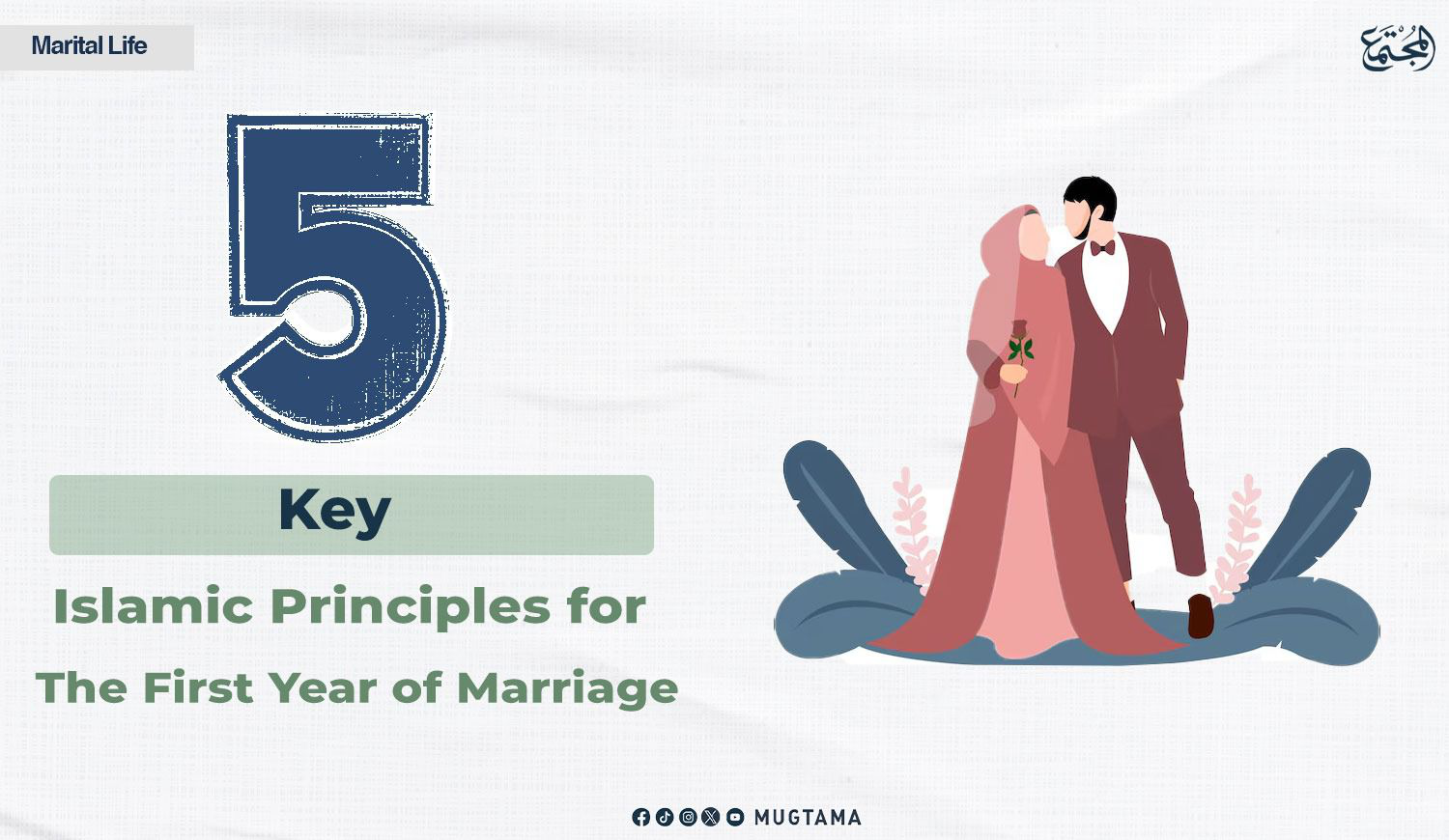5 Key Islamic Principles for the First Year of Marriage

The Importance of the First Year in Marriage
The first year in the journey of
marriage plays a decisive role in either achieving stability or not. It holds a
unique position in laying the foundation for the couple’s lifestyle, their way
of dealing with each other, and their approach to resolving conflicts and challenges in accordance
with the teachings of Islam.
It is certain that marital life
does not always run smoothly; it is only natural for problems and crises to
arise. However, the degree of understanding and cooperation between spouses is
enough to overcome such obstacles.
Family and social experts warn
about the dangers of “mining” the first year of marriage with conflicts that
can shatter the internal structure of the household and destroy the newly
formed family at the very beginning of its journey.
Wisdom dictates that precaution
should be taken to avoid such issues, and that the first year of marriage
should be considered a prelude to a happy life, a journey of hope and success
for a Muslim family built on the fear of Allah and the Sunnah of His Prophet
Muhammad (peace be upon him).
Key Principles for a Strong and Stable First Year of Marriage
This can be achieved through the
following:
1.
Establishing a Family Constitution
A family constitution should be
created by agreeing on rules and principles for marital life. These rules should
include guidelines on guardianship, financial support, raising children, and
managing household affairs. This must be done through dialogue and mutual
understanding.
It is preferable that these
matters be discussed during the engagement period to avoid future clashes.
Guidance should also be sought from scholars and advisors, with reference to Shariah
rulings and the Prophet’s (peace be upon him) example in managing his household.
2.
Managing the Family Budget Wisely
Spouses should agree on rules for
managing the household budget, clarifying who will be responsible for it, and
setting priorities in the first year of marriage. For example, if the husband
has debts from wedding expenses, they should be addressed.
Balance should be sought in
spending, avoiding extravagance and wastefulness, while also preparing for the possibility of a
new baby and the expenses that come with it. Both spouses should be guided by
the Verse of Allah: {Do not be so tight-fisted, for
you will be blameworthy; nor so open-handed, for you will end up in poverty.} [Al-Isra’,
17:29]
3.
Setting Boundaries with Families
Clear rules should be set
regarding how to deal with both sets of parents, the husband’s and the wife’s.
Respect and kindness towards parents are essential, along with maintaining
family ties. However, interference in the private affairs of the couple must be
avoided, as well as disclosing household secrets.
Non-mahrams should
not be allowed into the house in the husband’s absence under the pretense of
avoiding embarrassment. A weekly day could be dedicated to visiting or hosting
the parents of either spouse, strengthening ties between both families.
4.
Managing Marital Disagreements
Disagreements between
spouses should be handled according to the Qur’an and Sunnah, avoiding anger,
quarrels, and violence. Conflicts should be approached with wisdom, good
counsel, and private advice rather than public criticism.
Any conflict must remain a
private matter, not exposed to outsiders unless both spouses agree to seek
mediation. Forgiveness, patience, and good character should prevail.
In times of anger, self-control and forgiveness are necessary, inspired by the Prophet’s (peace
be upon him) guidance: “The strong man is not
the good wrestler; but the strong man is he who controls himself when he is
angry.” (Al-Bukhari) And when a
man asked him for advice, he said: “Do not get
angry.” The man repeated that several times and he replied, “Do not get angry.”
(Al-Bukhari)
5.
Fulfilling Emotional and Intimate Needs
Each spouse must care for the emotional and physical needs of the other. Marriage is meant
to be a source of tranquility, love, and lawful intimacy. Allah Says, {Your spouses are a garment for you as you are for them.}
[Al-Baqarah, 2:187]
And He says, {And one of His signs is that He created for you spouses
from among yourselves so that you may find comfort in them. And He has placed
between you compassion and mercy. Surely in this are signs for people who
reflect.} [Ar-Rum, 30:21]
Allah has permitted both spouses
to enjoy each other in a way that ensures chastity and fulfillment. The woman’s
right in this regard is equal to the man’s, for Allah Says, {Women have rights similar to those of men equitably.} [Al-Baqarah,
2:228]
You May Also Read:
- Psychological Insights of the Prophet’s ﷺ Marriage to Umm Salama
- Marital Relationship: Duties and Rights
- Marriage Without Excess: Love, Simplicity, and Contentment
-------------------------------------------------------------










